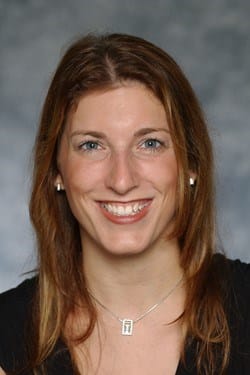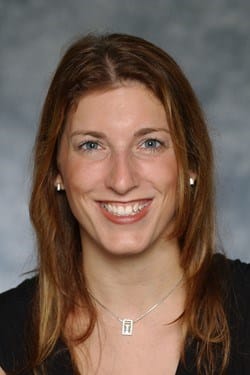
The Geosciences Division of the Council on Undergraduate Research has selected Jennifer Collins, professor in the School of Geosciences at the University of South Florida, as its 2020 Undergraduate Research Mentor Awardee. Dr. Collins is the 10th recipient of this annual award that recognizes role models who demonstrate productive and transformative student-faculty mentoring relationships and innovative approaches to undergraduate research. The award will be presented at the Geological Society of America’s Connects Online event on October 26–30, 2020.
Dr. Collins earned her BS Honors degree in physical geography from Lancaster University and her PhD in physics from University College London. She serves as a national councilor for the American Association of Geographers and is a past president of the West Central Florida Chapter of the American Meteorological Society. As a hurricane researcher, Dr. Collins studies the interaction between large-scale climatic patterns such as the El Niño–Southern Oscillation (ENSO) and the Madden–Julian Oscillation and seasonal patterns of tropical cyclone activity in multiple oceanic basins.
Dr. Collins is principal investigator of the National Science Foundation’s Research Experiences for Undergraduates Site “Weather, Climate, and Society” that encourages involvement of first- and second-year undergraduates, community college students, and underrepresented students in analyzing factors that affect decision making in hurricane evacuations. She works to give students experience in the entire scientific enterprise—from initial idea, project process, and publication of results to communication with the public about why the research matters. As one student commented, Dr. Collins encourages “students to creatively step outside typical boundaries.” Her students have embarked on a wide range of careers, including some who have received National Oceanic and Atmospheric Administration Hollings scholarships and served as Udall Fellows, as well as others who are leaders in science communication on television.
Founded in 1978, the Council on Undergraduate Research (CUR) focuses on providing high-quality and collaborative undergraduate research, scholarly, and creative activity. Among the many activities and networking opportunities that CUR provides, the organization also offers support for the professional growth of faculty and administrators through expert-designed institutes, conferences, and a wide-range of volunteer positions. The CUR community, made up of nearly 700 institutions and 13,000 individuals, continues to provide a platform for discussion and other resources related to mentoring, connecting, and creating relationships centered around undergraduate research. CUR’s advocacy efforts are also a large portion of its work as they strive to strengthen support for undergraduate research. Its continued growth in connections with representatives, private foundations, government agencies, and campuses world-wide provides value to its members and gives voice to undergraduate research. CUR is committed to inclusivity and diversity in all of its activities and our community.
CUR focuses on giving a voice to undergraduate research with learning through doing. It provides connections to a multitude of campuses and government agencies, all while promoting networking and professional growth to its community.
The University of South Florida is a preeminent research university located in the heart of Tampa Bay that is dedicated to empowering students to maximize their potential for lifelong success.


